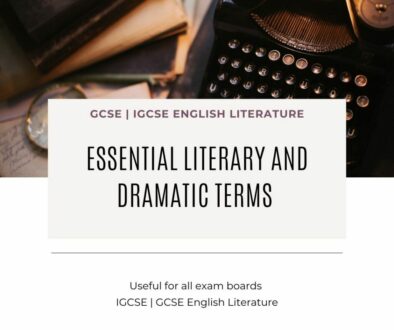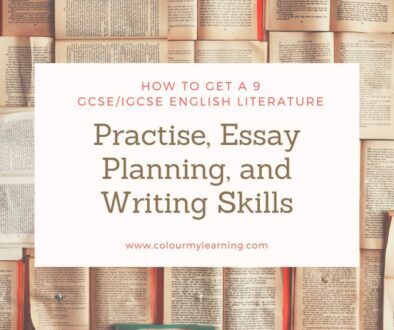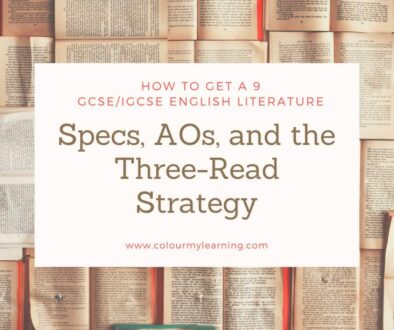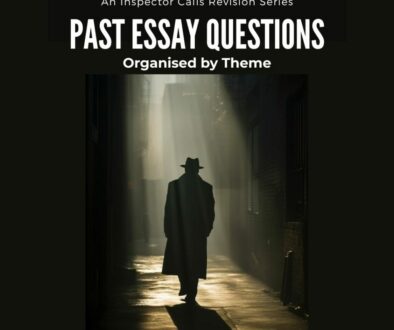How to Get a 9 in GCSE/IGCSE English Literature (Part 2): The Year 10–11 Roadmap for Set Text Essays
No matter where you are on your journey to your English Literature exam, it’s never too late (unless it’s the night before!) to aim higher. A grade 9 is within reach with focussed effort and attention. In this blog post, we outline the ideal preparation journey beginning in Year 10. But if you’re in the final leg of your revision, take a look at our advice on focussed effort for your final 3-6 months. Anything is possible.
This is Part 2 of a series of 3 blog posts on How to score a 9 for your English Literature exam at GCSE/IGCSE level. Part 1 Outlines the basic preparation of getting to know the syllabus intimately, knowing what AOs you need for each question and finding out how examiners mark. Here, in Part 2, we focus on how to allocate your time over the year or over the months leading up to your exam. Part 3 focuses on how to practise essay writing effectively and efficiently.
When to Begin Your Preparation Journey
In an ideal situation, you will start preparing in Year 10. However no matter where you are on your journey, every effort is worth it.
Year 10: Building Strong Foundations
Your primary goal during Year 10 is to become absolutely familiar with your all set texts. This means:
First Quarter: Read each text at least once through for pure enjoyment. You don’t need to analyse it yet, but read it over to absorb the story, characters, and overall themes. Let yourself respond naturally to what interests or surprises you.
I find as I read, that if I make judgements about how the characters behave, ‘would I respond the same way to a situation?’; the interactions between characters – are they true to life? It helps me remember the story better. Sometimes, literature presents situations and behaviours which are ‘of the era’ in which they are written, but also it is important to remember that writers often write to present a point of view that might challenge social constructs.
As you read your texts, simply for enjoyment, these things may become clearer or you may even have more questions. If you do, write them down – these are great to help when you start considering analysis.
The first reading is invaluable because it helps you build an emotional memory of the text. This means when you’re under exam pressure and asked to analyse, you will find yourself recalling these first impressions. Students who skip this stage, will often jump straight into analysis and rote memorising without really connecting to the writer’s intentions and examiners can often tell the difference. A strong grade 9 essay, is not only technically strong, but will show and exceptional understanding of the emotional centre of the story.
Second Quarter: As you move through the year, begin noting recurring ideas as you work through the book (whether on your own or in class with your teachers). Note which themes appear repeatedly? What motivates the main characters? How do they interact with each other You could start a simple notebook where you jot down interesting moments or confusing sections, or if you own the book, you could highlight short quotes or asterisk certain passages. You could also write notes in the margins.
Third Quarter: Now is the time when you work on building your quote collection. Aim for at least 20-25 memorable lines from each text that capture key moments, character development, and important themes. (Our Complete Revision Guides have pulled these resources for you, but you will still need to memorise them).
Don’t worry if at first the number of quotes seem overwhelming. Over time, you will find that some quotes may work generally, and some can be used across several themes. You will inevitably find yourself drawn to some more than others. Use that to your advantage.
Think of this early collection as a wide net. At first you may gather more than you will ever need, but over time you will notice which quotations are versatile and which are too narrow. By the end of Year 11, your goal is to refine this down to a “golden set” — around 10 to 15 quotations per text — that you know inside out and can apply flexibly to almost any question.
Final Quarter: Where possible, discuss your texts regularly. Talk about your ideas or understanding of the text with classmates, join online forums, or explain plot points to family members. Teaching others what you’ve learned will solidify your own understanding. If you find yourself disagreeing with someone about their ideas, that’s ok.
There are often more than one perspectives and there is no true right or wrong answer. It really is about how you present your point and how you use supporting statements and quotes to support your point.
Year 11: Intensive Skill Development
All that preparation in Year 10 will help you in Year 11. From now, you will need to focus on analytical precision and exam technique:
From Late summer/September-November: Re-read texts with analytical focus. Notice how authors use language, structure, and form to create meaning. Build your golden quote bank of 10-15 perfect quotations per text. Organise them by theme and character. Think about what the core points or arguments are that you might use for the themes that are prevalent in each text.
From late November -February: Master essay structure through regular outline practice. It will also help to read through highly graded sample essays. Not all of them will be good, and not all of them will write in a similar style that you have been taught or recommended, but all of them will have gained obvious marks for hitting relevant Assessment Objectives (AOs) (read the first post for more detail). Also try marking the sample essays to really know what the examiners are looking for.
Work on knowing what points you would use for the themes within the text. Complete at least one full essay per week, ideally under timed conditions, focusing on different question types and themes.
Examiner reports are a goldmine here. Each year, they explain why certain answers were awarded higher marks. Pay close attention to comments about structure and argument — examiners repeatedly emphasise that top-band essays are not simply lists of techniques but well-argued responses that show control and direction.
From end of February -May exams: This is when you will need to ramp up intensive exam preparation with timed practice. Write at least 2-3 full essays and week. Try to outline at least one essay a day and whenever you’ve finished writing an essay, work on a strategic review of your weaker areas.
When you review your essays, don’t just look for what went wrong. Highlight one paragraph that worked particularly well and ask yourself why. Was the point clear? Was the quotation well chosen? Did the analysis dig into technique rather than summary? Keeping a small record of these “best moves” builds confidence and gives you practical patterns to repeat in the exam.
Remember: the balance of skills expected can vary slightly by exam board. For example, Edexcel IGCSE places significant weight on AO2 (language, structure, form), while AQA GCSE expects you to integrate AO3 (context) more consistently. The foundation skills, however, remain the same: analyse carefully, argue clearly, and select quotations with precision.
Last-Minute Preparation (3-6 Months Before Exams)
If you are starting later, it is important to be honest with yourself: you will not have time for every possible activity, so your focus has to shift to the strategies that give the biggest return on effort. This is not about panic or endless late nights; it is about concentrated, purposeful work.
Six months before exams
At this stage, you should anchor yourself with a small but flexible set of quotations — ideally eight to ten per text — that you can apply to multiple themes and characters. Choose lines that are rich in meaning and adaptable rather than quotes that only work for one type of question. Alongside this, aim to sketch out around ten essay outlines that cover the “core” themes and characters for each text. Outlines should include a thesis statement, three main points, and the key quotations you would use. This keeps your thinking sharp even before you begin timed practice. Begin writing one timed essay a week to get comfortable with exam conditions.
Three months before exams
Here is when you must intensify your practice. Build your outline bank to fifteen or twenty, so you have rehearsed responses for almost every theme or character that might appear. Increase your essay writing to two or three full essays each week, written strictly under exam timing. The goal is not just to practise writing but to strengthen stamina and accuracy. Each time you finish an essay, compare it to Grade 8/9 exemplars and ask yourself: What are they doing that I am not yet?
Perhaps their introductions are sharper, their use of evidence more precise, or their analysis digs deeper into technique. Use those comparisons to set small, specific improvement targets for the next essay.
The final month
By now, you should feel secure in your knowledge of the texts and quotations. This final stretch is about refining and rehearsing. Complete whole past papers in timed conditions to replicate the rhythm of the exam. Practise introductions that clearly state your argument and conclusions that tie everything together confidently. Review your golden quotations every day, until recalling them feels automatic.
Pay attention to small details — handwriting clarity, timing per paragraph, even leaving space between paragraphs to keep your writing structured. At this point, every detail contributes to your overall confidence.
Key reminder: Starting late does not close the door to top grades. Many students find that the intensity of a focused, short-term plan actually sharpens their skills quickly. The difference is that you cannot afford to drift — every practice essay, every outline, and every quotation review has to count. Done with purpose, this approach can still lift you into the very top band.
Whichever board you are sitting, this final stretch looks very similar. The main differences are in question styles — some boards require extract + whole text, others full essays without extracts, and most include unseen poetry. By this stage, though, your routine of timed essays, refined quotations, and careful review will equip you to adapt.
If you’re starting late, focus ruthlessly on high-impact activities:
- Master 8-10 golden quotations per text that work across multiple essay questions
- Complete 15-20 essay outlines covering all major themes and characters (If you’re doing Edexcel IGCSE look at our database of past year questions)
- Practice full timed essays under exam conditions at least a couple of times a week.
- Study Grade 8/9 exemplar responses to understand what examiners reward
The secret to effective last-minute preparation is concentrated, purposeful practice rather than panicked all-night sessions.
Next, get the low-down on strategic practise, how to outline and how to build those essay writing skills and muscles.










